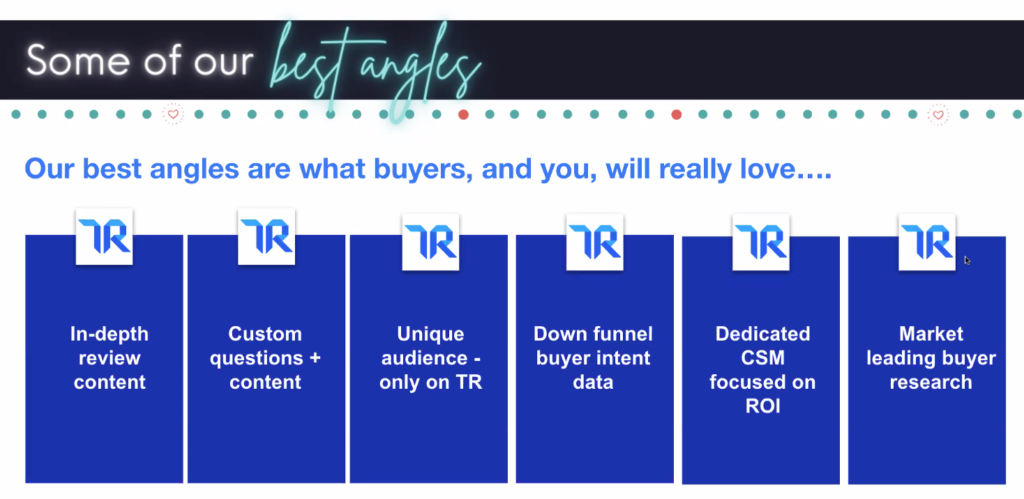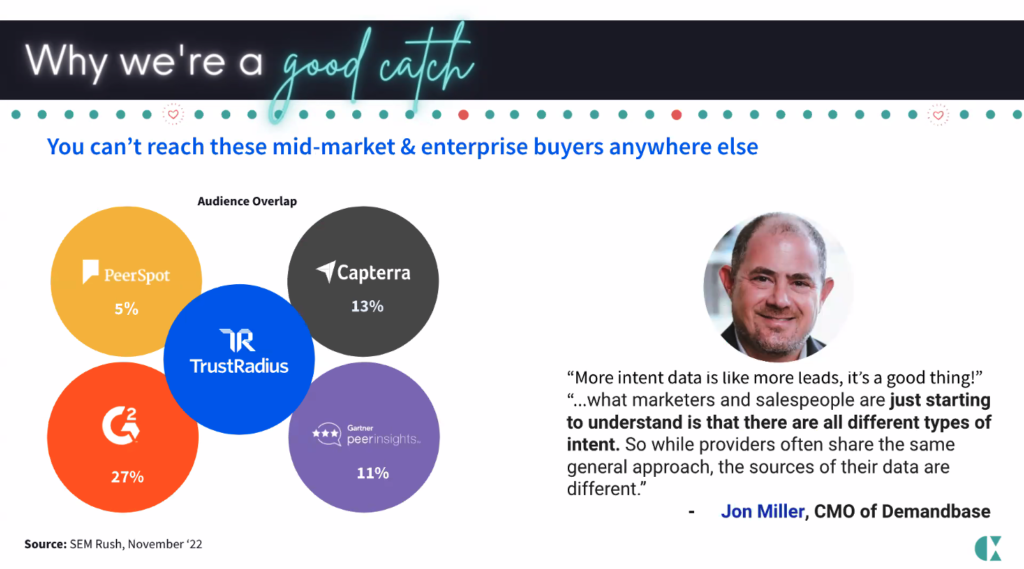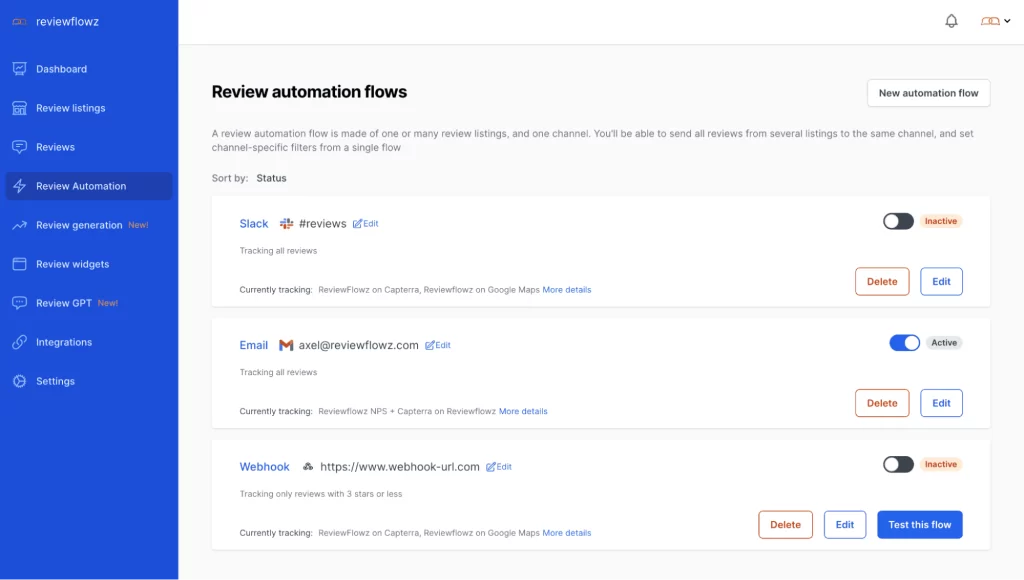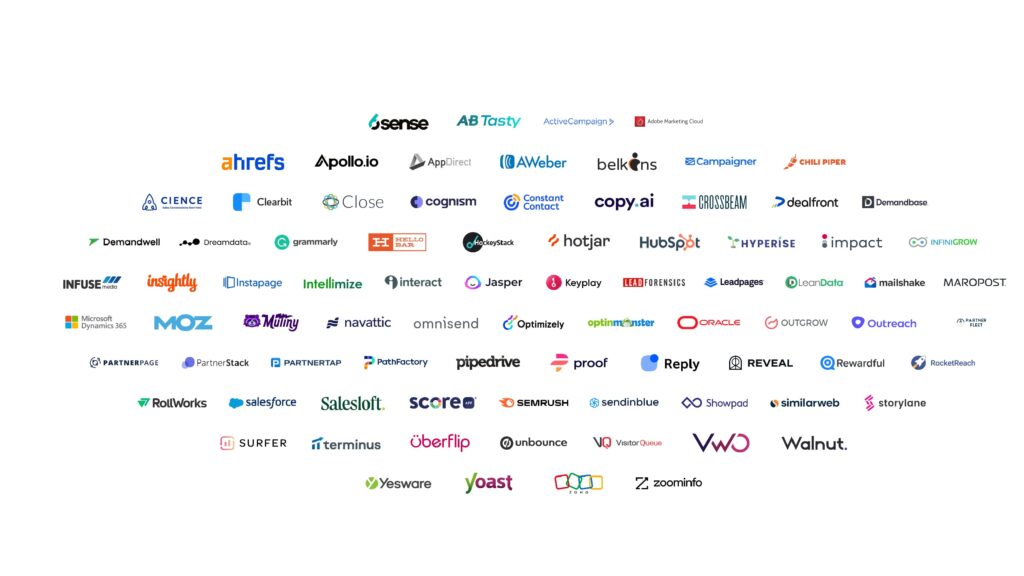Views on Reviews is a series of interviews with B2B SaaS professionals who provide a real-world perspective on what it’s like working on reviews. The sixteenth interview is with Vinay Bhagat, Founder and CEO of TrustRadius. In it, we cover trustworthy reviews and buyer decisioning.

Vinay Bhagat is a trailblazer in business software reviews.
As the Founder and CEO of TrustRadius, Vinay’s mission for more than ten years has been to help business software buyers confidently make decisions with comprehensive, vetted product information and trustworthy reviews.
He’s helping bring transparency and authenticity to reviews and raising the standard for what software buyers can expect when seeking guidance on purchasing decisions.
I’m grateful he took the time to share his views on reviews. We’ll dive into the deep end rather than ask Vinay the same surface-level questions he has often answered (see the links at the end of the interview to his other recent interviews.)
If you’re unfamiliar with TrustRadius, here’s what you need to know.
A Primer on TrustRadius
- TrustRadius is one of the leading software review sites. It’s evolving into a decisioning platform for B2B technology buyers.
- Founded in 2012 by Vinay Bhagat
- Vinay was inspired to create TrustRadius after experiencing firsthand how helpful online reviews were in his buying decision of a luxury espresso machine. As a software exec who had been burned on bad software purchases before based on analyst reports, he saw an opportunity to bring peer reviews to the forefront to help technology buyers make more informed, confident decisions.
- TrustRadius has a few key views on peer reviews:
- Quality over quantity
- TrustRadius supports its quality claim by citing the average reviewer on its site spends 18 minutes writing their review, and the average review is 400 words.
- Trust is earned with in-depth content and stamping out fake reviews
- TrustRadius takes a couple of key measures to ensure that reviews submitted to the platform are genuine and not manipulated by vendors:
- They’ve rejected 47% of the reviews and ratings submitted to their site for fraud, misinformation or lack of useful information.
- Their proprietary scoring algorithm, trScore(™), eliminates selection bias — vendor cherry-picking review candidates — from the product’s overall score.
- TrustRadius takes a couple of key measures to ensure that reviews submitted to the platform are genuine and not manipulated by vendors:
- Unbiased vendor placements – no sponsored listings
- TrustRadius is free to buyers and is a freemium platform for vendors
- Vendors can claim a free basic profile
- Vendors can pay for an advanced listing, intent data, and content licensing, among other offerings, but all scores, awards, ratings and reviews are reflected in unbiased customer sentiment.
- TrustRadius is free to buyers and is a freemium platform for vendors
- Quality over quantity
- Here’s how TrustRadius stands out to vendors:
Q&A with Vinay Bhagat
Now, let’s get to our questions for Vinay to get his latest views on reviews.
1. You’ve been in the software review business for over ten years. How do you believe the software review landscape has evolved, and what role has TrustRadius played?
The software review landscape has evolved tremendously. Reviews have become a central part of the B2B tech buyers’ research process. Per our latest buyer research, the 2023 B2B Buying Disconnect Report, 54% of buyers state that reviews are a top and most-influential source they consult, second only to product demos.
TrustRadius has been a principal participant in building the B2B customer review category. Our differentiation from inception has been our focus on providing high-quality insights to help buyers make confident decisions. Our reviews are packed full of insights, averaging 400 words in length versus less than 100 words on other sites. Reviewers answer critical questions sought by buyers like what’s your use case, what’s your ROI, and what alternatives did you consider. B2B buyers say that the two most important factors about reviews are feeling that the reviewer is relatable and understanding the substance of the content.
As B2B reviews have become more influential, they have also become more susceptible to gaming by vendors and fraud by individuals seeking incentives. TrustRadius has always placed a huge emphasis on fraud prevention and score bias mitigation. We have always screened every review through both technology and humans before publishing. We’re the only platform that corrects for score bias when vendors cherry-pick solely happy customers to write reviews. More than 50% of our ratings/reviews are collected independently of vendors and we overweight independent data points in our scoring algorithm, trScore, making it much harder for vendors to skew scores. We also reward vendors for asking for reviews openly from all customers, through our TRUE certification.
Our mission is to help buyers make confident decisions. Realizing that buyers need more than reviews to make a confident decision, we’ve evolved from a review site into a decisioning platform, adding multiple other content types sought by buyers, including pricing, security information, interactive product tours, and sandboxes.
Today, more than 1.5 million technology buyers rely on TrustRadius each month to conduct research and ultimately make a purchase decision. They spend on average 8-10 minutes comparing products and reviewing all the critical product information. As a result, we’ve become a highly influential source with buyers from the largest enterprises in the world to small and medium enterprises.
Just as importantly, we’ve helped vendors harness the power of customer voice captured within their reviews. Technology brands can expand their reach with a highly attractive in-market buying audience and articulate their differentiation to create preference. We’re the only platform that helps brands tell their unique story by asking customized review questions to their customers.
2. Quality over quantity is valued at TrustRadius. What steps do you take to engage with business software users and encourage them to provide in-depth reviews that can truly benefit other potential buyers?
We guide reviewers through a series of questions designed to tease out the most useful insights. Our review interface was designed and tested to motivate people to write comprehensive responses. While processing reviews, we hold reviewers to a quality threshold as well as checking for fraud and plagiarism. If responses are deemed insufficient, reviews are returned, and reviewers are requested to augment their reviews.
3. TrustRadius has recently started using the positioning of a “buyer decisioning platform.” Why “buyer decisioning” and not “review site”?
Our mission at TrustRadius is to help buyers make confident decisions, not just to identify which products to consider.
Our buyer research indicates that buyers need several critical pieces of information in order to make a confident decision. For the past six years, pricing, product demos, user reviews, and free trials/accounts have remained in the top five most commonly used information sources by buyers. New to the top five in 2023 was the use of “your own prior experience” as a commonly consulted resource, with a massive 20% jump from 31% in 2022 to 51% in 2023. That includes pricing, detailed feature information, demos/product tours, and in some instances, security information.
As you can see, buyers are becoming increasingly self-sufficient, relying mostly on self-serve resources to inform their buying decisions. Buyers are in a “prove it to me” mindset and need to self-serve product information, preferably all in one place. 97% of buyers said it would be somewhat or very helpful to have all of their buying research and resources in one place, and that’s what TrustRadius aims to provide as a decisioning platform.
The newest addition is our buyer research boards. Recently released, this feature allows buyers to address the highly unstructured process of collaborating across the buying committee. Now, 30% of buyers say that collaboration among decision-makers has increased. To streamline that process we introduced research boards so buyers can enter product requirements and get suggested alternatives that meet their needs. The entire buying committee can evaluate alternatives and stack rank their technology shortlists in a cohesive and shareable dashboard.
4. There’s less overlap than one might think between TrustRadius’s audience and other business software review sites. In general, you all compete for the same buyer intent search terms and are SEO-driven sites. Can you help us understand how the audience overlap is less than one may expect?
That’s correct. There’s 27% overlap with G2 and just 11% with Gartner Peer Insights, meaning of the audience we reach, 27% also use G2 and just 11% also use Gartner Peer Insights. We tend to attract a more mid-market and enterprise audience than G2 due to the depth of our content. Our long-form reviews also help us rank for a large number of long-tail keywords relevant to buyers.
5. One of the lesser-known benefits that TrustRadius can offer a vendor is SEO through your TrustQuotes widget. How it helps improve on-page conversion is straightforward: customer proof from review content compels more visitors to take the next step. The SEO benefit is harder to understand fully. You’ve said the widget gets crawled by the Google bot, and you don’t get penalized for duplicate content, and that one can markup the widget to show review data like ratings and review counts in an organic search result on a vendor name. Can you help us understand the SEO use case for digital marketers, clarify how the widget content is not considered duplicate, and provide an example of a vendor using the widget to markup their review count in an organic search result?
The TrustQuotes widget enables a brand to embed quotes based on a specific theme to a web page, so that the quotes that render are contextually relevant to the focus of that page, and hence highly relevant to the information that a buyer is seeking.
There are two primary use cases: to improve conversion by providing contextual social proof and to boost SEO performance, e.g. grow organic traffic.
In the SEO use case, the widget drives more organic traffic through three factors:
- Improving indexation for long-tail keywords, i.e. the ability for a brand to rank for targeted keywords, thereby increasing exposure with prospective buyers. TrustRadius reviews are keyword-rich. When quotes from reviews are syndicated to a web page, that content is crawled by search engines and helps boost the page’s authority for associated keywords. The TrustRadius team can also design custom questions to increase the likelihood of creating content associated with targeted keywords.
- Improving on-page engagement and, therefore, Google Page Value. The TrustRadius widget is designed to be interactive and engaging. Buyers are able to scroll between quotes to find the ones that they most relate to. As a result, the TrustRadius widget increases on-page engagement by about 30% as measured by time on page and scroll depth. This results in an increase of Google Page Value, which makes Google more likely to send traffic to the page.
- Highlighting social proof in the SERP. The TrustRadius widget is able to add markup to the SERP to display the count of reviews and trScore (star rating). This distinguishes the SERP from others, making it more likely that viewers will click on it, and therefore improving the click-through rate. This results in improving the ranking of the SERP over time.
Here’s an example of how the Trustquotes widget highlights social proof in the SERP for Hootsuite:
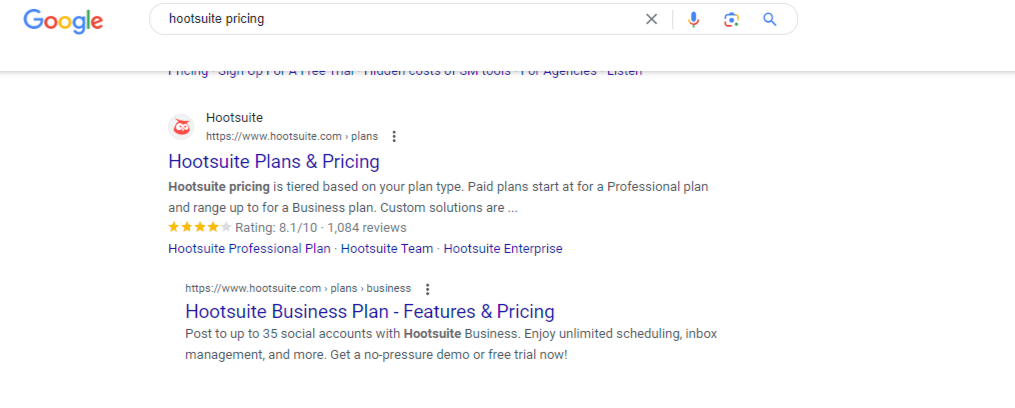
6. Can you share a favourite — British and Canadian spelling for you and me 😉 — a success story of a business that has found the right software solutions through TrustRadius, and how the platform has impacted their decision-making process? Or a favourite vendor success story?
Here’s one of my favourite buyer success stories:
"Content quality is super important for me. We can all read Amazon reviews and half the time they're just real funny because anybody can write one about anything. With TrustRadius’ [reviews] it's people who are in the weeds like I am using this stuff on a daily basis. The way people describe how it's affecting their work and whether or not it's improving their quality of work or making it harder to get their jobs done is something you don't get from a lot of software reviews that I found elsewhere. It's just the quality is the huge thing for me…just the time people spend on it."
Nathan Morimitsu, technology buyer
One of my favourite customer success stories is Hootsuite.
Hootsuite’s goal when partnering with TrustRadius was to increase organic traffic and rank for keywords to accelerate the path to conversion on key web pages like pricing and packaging.
What Hootsuite set out to do:
- Generate high-quality reviews for usage in the syndication widget.
- Build and place widgets on pricing and packaging pages to increase impressions + clicks.
- Monitor SEO KPIs for “hootsuite cost” and “hootsuite pricing” to /plans page.
By embedding keyword-heavy customer quotes from reviews on their pricing and packaging pages, they were able to increase traffic, CVR, and brand trust.
Consider these SEO results:
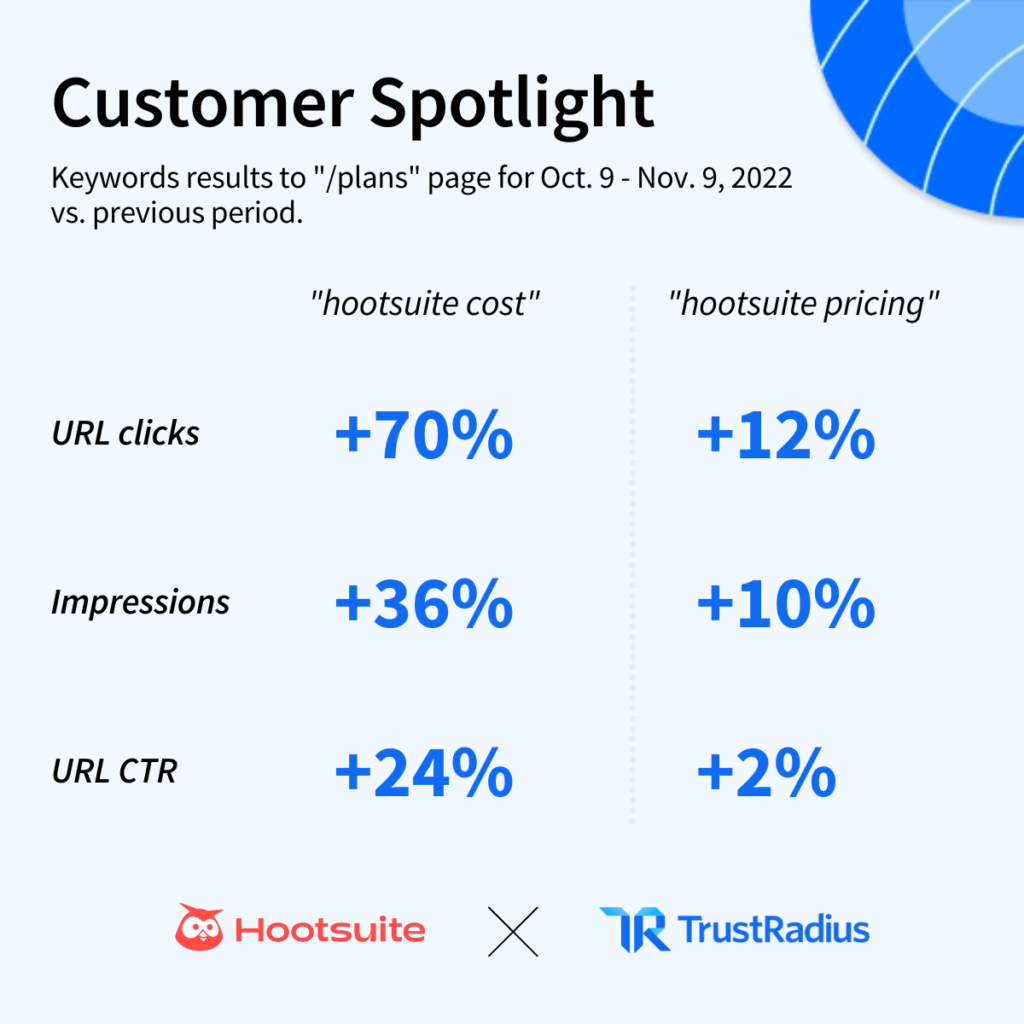
“Our team’s goal was to improve conversion rate and rankings on key pages across the website. We knew other TrustRadius customers were using reviews in the TrustRadius syndication widget to boost SEO KPIs. As a result, our team prioritized placing the syndication widget and we saw increases in clicks, impressions, and CTA engagement!”
Margaret Kapitany, Pipeline Marketing Programs Specialist, Hootsuite
7. A loaded question: what advice would you give to software vendors who want to improve their presence on TrustRadius and leverage the platform to grow their business?
There are three things that vendors can do for free on TrustRadius:
- Ensure their profile is accurate and complete. Add feature information, pricing, demos, or, ideally, an interactive tour. Here’s an example of Hootsuite’s strong profile.
- Encourage relevant personas at customers to write helpful reviews. Buyers seek information from reviewers that they can relate to, buyers who are in a similar role or industry and share a similar use case. It’s helpful therefore to have a representative sample of reviews that reflects all the use cases and customer segments you serve. Volume is not more meaningful to buyers, and they are not going to read hundreds of reviews. Relevance matters more than quantity. For decisions of consequence, buyers also seek substantive content that helps them discern which product is the best for them and if it will meet their use case. Quality matters more than quantity.
- Listen to and act upon customer feedback from reviews.
With a commercial partnership with TrustRadius, vendors can:
- Capture demand through lead forms and referral links to their website.
- Enhance review generation and scale customer marketing programs.
- Differentiate themselves by working with us to define custom review questions designed to help them extract insights about differentiating features and capabilities.
- Develop a larger volume of reviews with our campaign support, best practices advice, and assistance to generate reviews at events.
- Drive video reviews in addition to written reviews.
- Identify new customer references.
- Easily keep reviews refreshed and updated as your product evolves.
- Use review content in their own channels.
- Dynamically syndicate contextual review quotes to your own web pages to improve conversion and SEO.
- Enable SDRs and AEs to find the right quotes for prospecting, nurturing, and selling through our browser-based sales enablement tool, the TrustRadius Chrome extension.
- Utilize quotes and other social proof in ads, product collateral, and sales decks.
- Utilize buyer intent data.
- Target ads to in-market buyers considering your product or considering your competitors but not you, increasing your ad conversion rates and lowering your CPL.
- Enable SDRs and AEs to direct prospecting efforts to buyers most likely to respond, improving prospecting yields and SDR efficiency.
- Provide intelligence to AEs about competition being considered to improve win rates.
8. What do you see in the future of software reviews, and what role will TrustRadius play?
For buyers:
One-stop shop: Reviews are only a part of what buyers need to make a confident decision. They also seek other essential information like pricing, feature information, security specs, and access to demos and tours. Sometimes, they want to take a product for a test drive. In some cases, they want to talk to other users to go deeper. TrustRadius is working to support the end-to-end needs of buyers and be their one-stop-shop information resource. We’ve added pricing data, partnered with vendors in the interactive tour space to add product tours, partnered with TestBox to enable live testing of products, added security information through a partnership with Whistic, and we’re enabling buyers to use conversations through our partnership with LinkedIn.
Single pane of glass: Our research indicates that buyers visit multiple resources today to gain the information they need. In some cases, that includes multiple review sites and social forums. TrustRadius aims to be the “single pane of glass” view that aggregates insights from multiple sources.
Synthesis: Buyers don’t want to trawl through 100+ reviews. They want a summarization, ideally versioned to them. We are using LLMs to synthesize and summarize review content.
Collaborative buying tools: Many larger companies buy in teams. Often, the buying process is unstructured, and information gathering is disjointed. We’re working on solving this problem through our “Research Boards,” which help buying teams define and manage their short-list, organize their research, and whittle down their choices to make a final decision.
And so much more…
For vendors:
Build your brand preference, tell your differentiated narrative with the customer voice, and increase your discoverability with customer-generated content.
Move up market by influencing a qualified, engaged audience of mid-market and enterprise buyers on TrustRadius.
Direct demand generation from TrustRadius is easy for vendors with lead forms and CTAs accessible from their profiles. Most of our customers also use the downstream intent signals to know which accounts are actively researching their product or their competitors’. Today we have integrated with LinkedIn, Salesforce, and ABM systems 6Sense, Demandbase, and Intentsify. Our customers also use these signals to reduce churn risk. If they see one of their customers on TrustRadius researching their competitors, they know that account is at risk, and the customer success team is alerted.
Advanced reporting and analytics: Vendors need reporting and insights to get the most from their presence of TrustRadius. Our customers can see how they are performing relative to competitors, and they can draw insights from their reviews and then evangelize specific insights within their organizations. For example, our customers can pull product feedback from reviews and synthesize it for their product team. They can also look at brand sentiment and keywords their customers use to describe their product to influence company messaging.
The possibilities for injecting an organization with the customer voice is endless.
9. As a successful entrepreneur, what lessons have you learned from founding TrustRadius that you believe other aspiring entrepreneurs can benefit from?
Here are two lessons:
Having the right people on your team is a massive needle-mover and allows you to be more strategic as a CEO/founder.
It’s critical to actively listen to the market and your customers. Make sure you have meaningful listening posts, including a customer advisory board.
10. What stood out to you from the 2023 TrustRadius B2B Buying Disconnect report in terms of buying trends and why?
One trend that we are seeing over time is the influence of B2C buying preferences as they transcend to B2B. Most of the buying committee members are millennials and Gen Zs. They are digital natives who are used to having information at their fingertips and then validating that with their peers. They are skeptical of technology vendors overpromising and under-delivering. And now, with the current economic climate, they are more risk-averse than ever before.
One of the most influential resources for buyers that jumped to the top of the list this year was their own prior experience. This is a super important stat for customer marketing and advocacy professionals. Every company should build a customer advocacy program, because when they move companies, they could be a source of new business.
I encourage everyone to look at the report. It’s filled with useful data and insights to reshape the B2B go-to-market playbook.
Check out the full report here and access the free media kit here.
Key Takeaways
- Buyers Increasingly Rely on Personal Experience: While reviews remain one of buyers’ most influential sources of information, they’re influenced by other sources, too. The biggest jump in the past year has been buyers relying on their own prior experience, raising the need for customer advocacy programs and marketing to previous customers/users.
- Younger Buyers Seek Self-Sufficiency In Software Buying: More and more members of software buying committees are millennials and Gen Zs. They’re digital natives who tend to be self-sufficient and want to conduct more of the buying process independently from the vendors they’re considering. And now, with the current economic climate, they are more risk-averse than ever before and want vendors to “prove it to me,” leading to a rise in interactive product demos, trials, and sandboxes.
- Distinct Buyer Audiences: Vendors Should Embrace Multi-Review Site Strategy for Business Software: Business software review sites may appear similar, but the traffic to each may differ more than expected. For example, TrustRadius only has a 27% overlap with G2, 13% with Capterra, 11% with Gartner Peer Insights, and 5% with PeerSpot. Therefore, vendors should consider a multi-review site strategy to capture a wider buying audience.
- TrustRadius Evolves into “Buyer Decisioning Platform” to Provide Comprehensive Product Information: Buyers want more than pros and cons in a review. They want pricing, security information, interactive product tours, and sandboxes to help make an informed decision. Hence, TrustRadius’s shift from a review site to a buyer decisioning platform.
- TrustRadius’s TrustQuotes Widget can boost SEO: In addition to TrustRadius’s well-known buyer intent and content licensing solution, it can also help vendors boost SEO through its TrustQuotes Widget by improving indexation for long-tail keywords, improving on-page engagement and, therefore, Google Page Value, and highlighting social proof in the SERP.
- Free Tips to Enhance Vendor Presence on TrustRadius and other Review Sites: Vendors can improve their presence on TrustRadius — and other review sites — for free by completing their vendor profile, listening and acting upon customer feedback from reviews, and getting reviews from a wide range of personas. TrustRadius has found that buyers seek information from reviewers that they can relate to (similar role, industry and use case).
- The Future of Software Reviews: Integrated, Synthesized, and Collaborative: Vinay sees the future of software reviews as more integrated, synthesized, and collaborative. Reviews will play an integrated role alongside other essential information like pricing, security specs, product demos and tours. Reviews will be synthesized so buyers don’t have to trawl dozens of reviews. Buyers will have tools to collaborate with their team on the review and review-related content they use in buying decisions.
To learn more from Vinay Bhagat
To get more of Vinay’s views on reviews, check out these other recent interviews he’s given:
- MarTech360 Interview With Vinay Bhagat, Founder And CEO, TrustRadius. Post:
- Key learning: high-level intro on TrustRadius and how reviews help boost sales.
- Truth Sells!, Vinay Bhagat Founder & CEO, @TrustRadius. Evan Kirstel B2B TechFluencer. Video:
- Key learning: deeper dive into TrustRadius and how software buyers buy in 2023.
- How to Leverage Review Platforms Like TrustRadius, David Lewis, DemandGen TV. Video:
- Key learning: how B2B buyers conduct research when making purchases.
- Sour & SaaS – Season 4 Episode 2 – with Founder & CEO at TrustRadius, Vinay Bhagat. Video:
- Key learning: how TrustRadius fits into the business software review landscape and its offerings.
- Episode 34: Vinay Bhagat and Jeff Ernst, B2B Category Creators on Metadata.io. Podcast:
- Key learning: Founder & CEO perspective on fundraising, customer feedback, and educational content.
To learn more from Vinay and TrustRadius:
- Follow Vinay and TrustRadius on LinkedIn
- Claim your free TrustRadius profile
- Read the 2023 B2B Buying Disconnect Report
- Get your free Review Growth Kit from TrustRadius
Authors
-

I'm the Founder and Editor-In-Chief of B2B SaaS Reviews and the Director of Demand Generation at PartnerStack, the leading platform for partner management and affiliate marketing in B2B SaaS. My experience spans several notable B2B SaaS companies, including Influitive (Advocate Marketing), LevelJump (Sales Enablement, acquired by Salesforce), and Eloqua (Marketing Automation, acquired by Oracle). I hold a Bachelor of Commerce in Marketing Management from Toronto Metropolitan University and a Master of International Business from Queen's University, with academic exchanges at Copenhagen Business School and Bocconi University.
-

Vinay is the Founder and CEO of TrustRadius, a buyer decisioning platform that helps professionals research B2B technology products and services and helps vendors accelerate demand and sales and deliver stronger products. His first venture, Convio, became the leading provider of SaaS solutions to the nonprofit sector. He scaled it to over $80m in revenue and 450 employees before Blackbaud acquired it for $325m in May 2012.

